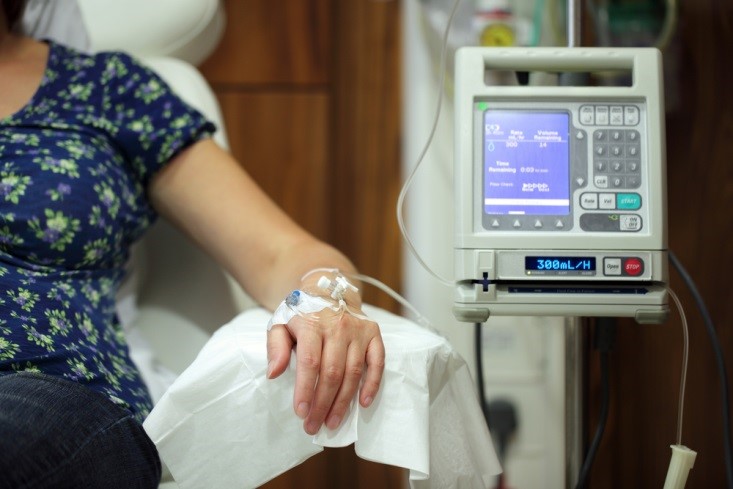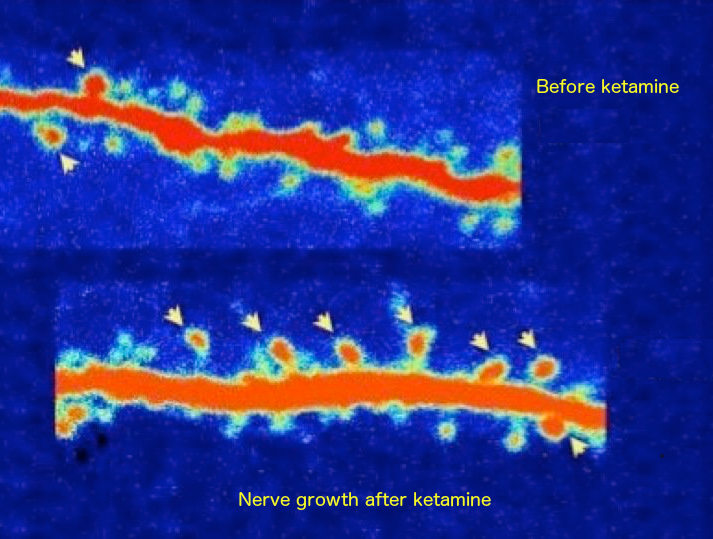Ketamine Infusion Therapy
What is Ketamine?
Ketamine is traditionally known as a medicine that is used to cause a state of unconsciousness, or anesthesia. You may have heard that ketamine is mostly used in the clubs, hence the “club drug” name. However, ketamine was used as a medical anesthetic for many years, long before it became known as a ‘club drug.’ Ketamine is classified as a dissociative anesthetic, which means it has both dissociative an anesthetic properties.
Ketamine was first created in 1962 and used mostly during the Vietnam War in the 1970s as battlefield anesthetic. Recently, ketamine is being used to help treat severe depression.


Effects of depression and ketamine on synaptic glutamate release and its subsequent binding to AMPA receptors leading to synaptogenesis in the prefrontal cortex. BDNF, brain-derived neurotrophic factor.
Photo credit: “Ketamine Treatment for Mood Disorders” by Andrew Klise, MD; Brian Lerner, MD; Marc F. Ettensohn, MD; and Steven P. Levine, MD.
How does it Work?
As a consequence to chronic stress, changes in glutamatergic neurons include reductions in synapse density, synapse diameter, and dendritic length and branching occur.
Ketamine acts on depression by rebalancing a different set of neurotransmitters and receptors, NMDA/glutamate receptors and GABA receptors, rather than the old-fashioned Selective Serotonin Reuptake Inhibitors (SSR). By blocking glutamate receptors in the brain, the majority of patients with treatment resistant depression are able to experience relief from their symptoms using ketamine (immediately).
Ketamine works as an NMDA receptor antagonist and an AMPA receptor stimulator. As that being said, ketamine stimulates the development of new receptors and synapses in the brain by interfering with and rebalancing the glutamatergic system to stimulate new synaptic connections.
(This is an hour consultation with Dr.Davila to discuss medical history. The cost for the consultation is $300, which is a part of the total cost of the treatment of $6,000.00.)
Ketamine for Depression
The latest game-changing discovery in depression treatment was that low doses of the anesthetic ketamine have antidepressant effects via a novel mechanism of action. You may have already hear that Major Depressive Disorder (MDD) is a leading cause of disability among adults worldwide in this century (actually, it has been for a long time). According Greenberg, it estimated that the total cost of MDD which includes productivity loss, suicide-related costs, and direct care cost, was $210.5 billion in 2010.
Patients receive an intravenous infusion of low dose of ketamine which delivers rapid effect. Because of its rapid effect, ketamine is very beneficial to treatment resistant and suicidal patients.
Video Player
Infusion Program
- Ketamine Infusion Procedure
- Dose and Delivery
- No Medication Required
- Not FDA-Approved

Clinical Results
Of Ketamine Infusion Effectiveness

Other Conditions Ketamine can Treat
In our office, Ketamine Infusion Therapy is for treating Depression. However, research have shown that Ketamine can treat other conditions including:
- Anxiety
- Bipolar Disorder
- Post-Traumatic Stress Disorder
- Chronic pains
- Fibromyalgia
- Rheumatoid Arthritis
- Migraine Headaches
- Neuropathic Pain
Side Effects of Ketamine Compared to Medication
If medication is causing you many side effects, Ketamine is another alternative to all the side effects included with antidepressants. The side effects that could occur during or after the infusion are:
- Feeling drowsy or sleepy
- Dizziness/faintness
- Poor coordination/unsteadiness
- Headache
There is small risk of these side effects because the dosage is quite small. If they are any of these side effects, they generally resolved within 4 to 24 hours after each infusion. For this reason, patients are typically prohibited from driving on the same day.


